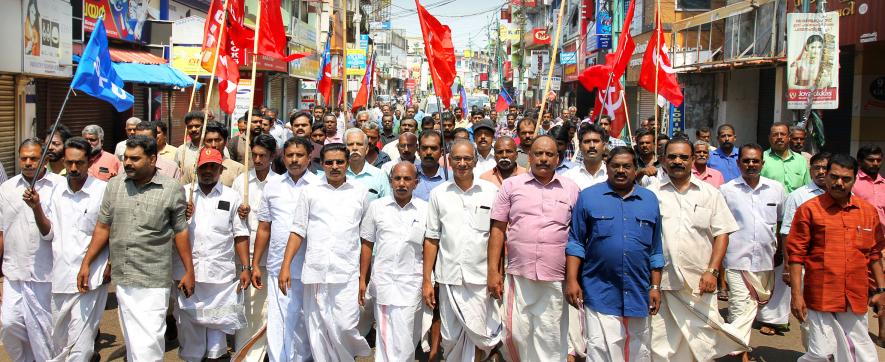Workers Strike In Kerala Against Fixed-Term Employment

Workers in Kerala brought all industrial and commercial activities to a standstill on 2 April — protesting against the “fixed-term employment” rules introduced by the BJP-led NDA government that give a free hand to all businesses to “hire and fire” workers.
Sixteen Trade Unions in Kerala — both state and central level — had jointly given a call for a 24-hour statewide general strike, against the Modi government’s order issued on 16 March amending the Industrial Employment (Standing Orders) Central Rules, 1946.
The central government has allowed all industrial sectors to hire workers on contract basis for a fixed term — which could be anything from weeks to months — and fire them whenever they want, without giving notice or retrenchment pay.
In support of the strike, the Centre of Indian Trade Unions (CITU) had also called for nationwide action programmes to be held on 2 April.
In Kerala, industrial workers from private as well as public sector, unorganised workers, commercial establishment workers, and even technocrats, participated in the strike.
Factories, shops and commercial establishments remained shut across the state, while the state transport buses and most other vehicles stayed off the roads. Protest demonstrations and rallies by workers were held in all districts.
In Trivandrum, around 15,000 workers participated in a protest rally to the Governor’s residence. After the procession, a protest meeting was held.
CITU state president Anathalavattom Anandan inaugurated the meeting. State president of the Indian National Trade Union Congress (INTUC) R Chandrashekhar presided over the protest meeting, while All India Trade Union Congress (AITUC) leader KP Rajendran, United Trade Union Congress (UTUC) leader Shibu Baby John, and several other Trade Union leaders addressed the workers.
Even though the RSS-affiliated Bharatiya Mazdoor Sangh (BMS) leadership stayed away from the strike, workers associated with the union also participated in the general strike.
“The strike was an unprecedented success as it drew a tremendous response from the people. There was total participation by workers, because nobody was opposing this strike,” said Elamaram Kareem, the general secretary of CITU in Kerala and former state minister, speaking to Newsclick.
“In Kerala’s main industrial area, Ernakulam, all industries including the Cochin Shipyard Vallarpadam Container Transshipment Terminal. In another major industrial area, Kanjikode in Palakkad, workers at two multinational company units, Pepsi Cola and St. Gobain, observed total strike. Similarly, in Thrissur, at another industrial unit of Apollo Tyres, there was cent per cent participation,” he said.
In fact, even the IT sector workers supported the general strike.
“The two major IT hubs of Kerala — InfoPark and Techno Park — were also severely hit by the strike. Usually, general strikes has no effect on the IT sector, but this time most of the technocrats participated in the strike as they are also against fixed-term employment,” Kareem said.
All state and central public sector enterprises also remained closed, he said.
Meanwhile, protest actions were also held in other parts of the country, on the call given by CITU.
In Assam, there were protest demonstrations in several districts, including Jorhat, Dibrugarh and state capital Guwahati.
In Rajasthan capital Jaipur, a protest rally was taken out.
In West Bengal, all trade unions participated in the protest demonstrations held in all districts. In state capital Calcutta, the protesting workers even met the labour commissioner.
Protests were also held in Telangana and Tamil Nadu.
Throughout the country, workers under CITU also supported the ‘Bharat Bandh’ protest on 2 April against the Supreme Court’s decision to amend the Scheduled Castes and Scheduled Tribes (Prevention of Atrocities) Act, severely diluting key protections for Dalits and Adivasis that are enshrined in the law.
Get the latest reports & analysis with people's perspective on Protests, movements & deep analytical videos, discussions of the current affairs in your Telegram app. Subscribe to NewsClick's Telegram channel & get Real-Time updates on stories, as they get published on our website.























